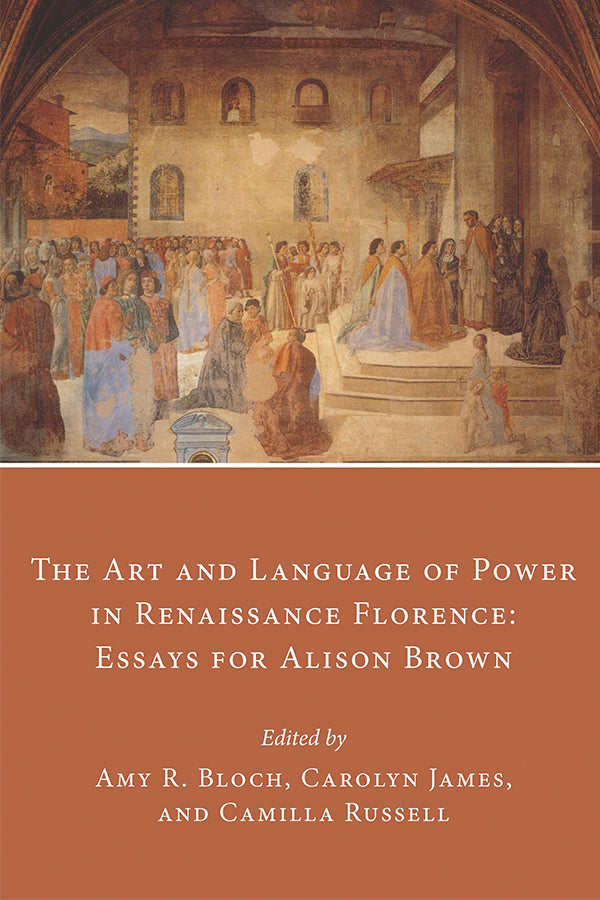The Art and Language of Power in Renaissance Florence: Essays for Alison Brown
Edited by Amy R. Bloch, Carolyn James, & Camilla Russell - ES42
Overview
ISBN: 978-0-7727-5659-6 softcover, 978-0-7727-5661-9 hardcover
Published: 2019
Contents
Preface – Amy R. Bloch, Carolyn James and Camilla Russell
Introductory Essay
1. Roslyn Pesman, "Alison Brown and Late Fifteenth-Century Florentine History: An Appreciation"
The Political and Social Milieu of Renaissance Florence
2. Luca Boschetto, "Machiavelli’s Family and Social Background: The Enigma of Messer Bernardo’s Illegitimacy"
3. Francesco Guidi-Bruscoli, "The 1487 Medici-Cybo Marriage and its Implications for the Medici Bank in Rome"
4. Lorenzo Fabbri, "Women’s Rights According to Lorenzo De’ Medici: The Borromei-Pazzi Dispute and the Lex de testamentis"
5. Andrea Guidi, "Chancellor Angelo Marzi da San Gimignano: An Episode in Record-Keeping and the Rise of Medicean Autocracy in Sixteenth-Century Florence"
6. Fabrizio Ricciardelli, "Social Control and Political Consensus in Quattrocento Florence"
7. Jérémie Barthas, "'Altra volta ne ragionai a lungo': A Reinterpretation of Niccolò Machiavelli’s Cryptic Clause in The Prince"
Art in Political and Ritual Contexts
8. Riccardo Fubini, "The Portico Frieze of the Medici Villa at Poggio a Caiano: Giovanni Pico della Mirandola’s Influence"
9. Amy R. Bloch, "A Note on the Movement of Michelangelo’s David"
10. Jonathan K. Nelson, "Breaking Conventions: Donor Portraits in Ghirlandaio’s Malatesta Altarpiece"
11. Eckart Marchand, "The Materials of Ephemeral Sculpture in Renaissance Italy"
Humanism, The History of Ideas, And Intellectual Life: From Renaissance Florence to Twentieth-Century London
12. Gabriele Pedullà, "Against Peacemakers: Niccolò Machiavelli on the End of Tumults"
13. Simone Testa, "'Che l’amore seguiti l’interesse': The Language of Power in Giovanfrancesco Lottini’s Discorso sopra le attioni del conclave"
14. Maia Wellington Gahtan, "Historia testis temporum: Cesare Ripa’s Historia between Philosophy and Allegory"
15. Stefano U. Baldassarri, "Feigning Ignorance: The Case of Giannozzo Manetti’s Against the Jews and the Gentiles"
16. Maria Fubini Leuzzi, "Vincenzio Borghini’s Travelling Library"
17. Camilla Russell, "The Renaissance Comes to Bloomsbury: Studies in the Italian Renaissance in Twentieth-Century London"
Concluding Essay
18. John M. Najemy, "Alison Brown’s Florentine Revolution"
Praise
— William Caferro, Vanderbilt University
"This volume digs deep into Alison Brown’s terrain, the political culture of Renaissance Florence, with interlocking and original essays on politics, art, and humanism that combine big arguments and extensive archival research … a thematically tight and focused festschrift."
— Mark Jurdjevic, Glendon College, York University
Couldn't load pickup availability


